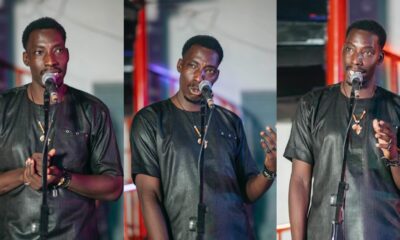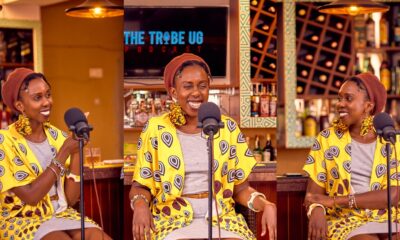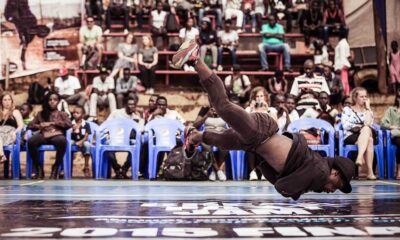Interview
EXCLUSIVE: A Chat With The Homie, Life After MTN Rap Battles, Debut EP & UG Hip-Hop.
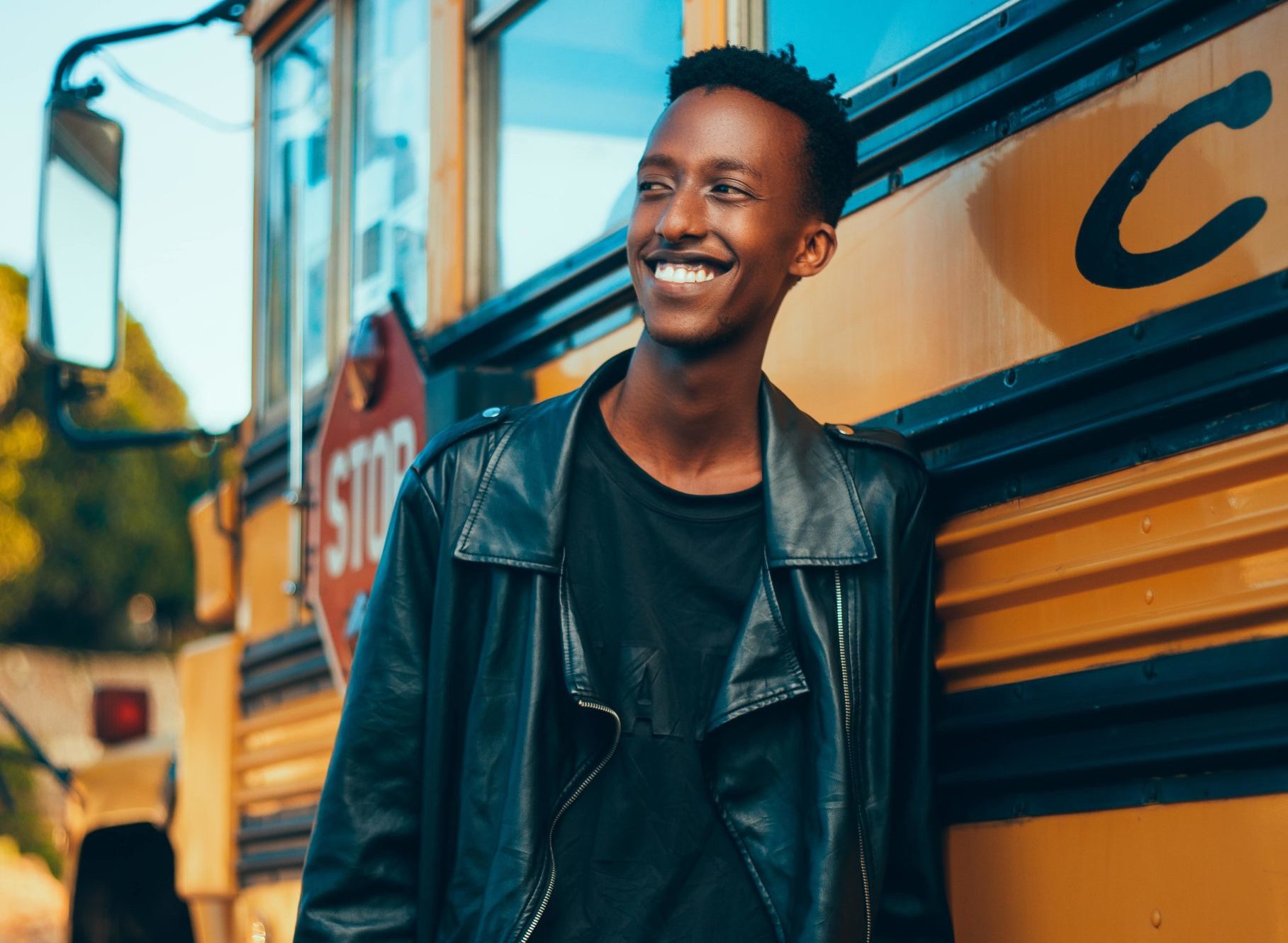
One of the things the UG Hip-Hop Awards do is introduce new acts to the Ugandan audience. This year it was beyond the usual as they tied in the MTN Pulse Rap Battles which added flavor and also brough new rappers to the fore front. One of the acts that stood out was The Homie as he obliterated his opponents line for line, bar for bar. That night he was the crowd’s favorite however he didn’t emerge the winner of the MTN Pulse Rap Battles. He came in a close third and bagged UGX. 5M. Like most musical oriented competitions, the winners tend to disappear after they have secured the prize, but not The Homie. Since the battles ended he has put out a single “Say Goodbye” and an EP dropping on Sunday 19th July. So, as we wait for the EP we decided to catch up with the rapper to understand how the journey has been thus far, challenges and ofcourse his top 5 Ugandan rappers. Have a good read!
What’s good Homie?! Thanks for doing this. How have you been surviving the lockdown, maintaining creativity and all that?
Man it’s a pleasure, well ofcourse everyone dreads the current situation but im a glass half full type of guy , so Ive been using the free time to create as much as I can and do research on my peers, I’ve probably listened to the entire catalogue of people I consider inspirations and competition, and to cap it all of I wrote and recorded my six track debut EP, East African Boy.
Let’s dive into it, let’s talk about the MTN Pulse Rap Battles [MPRB], how was your experience on that competition and has it moulded you in anyway in any way?!
The MPRB was an experience of a lifetime, I met so many talented artists, so many!! I always believed I could rap but now I had to prove it and be judged by people I considered idols, I have never been so excited about anything ever, I finally had the platform that I was desperately looking for, before hand I always told my bro and the people at home, “I swear if I get to spit a 16 for Nav, he’ll sign me man I swear”, if only it was that easy.
Away from that I got to see that to be as established as the artists I looked up to, you had to put in work because for every episode I had to have like 3-4 of my hardest verses memorised and sometimes we would shoot two episodes in one day, and then there is freestyle which I had never done in my life, I’m a punchline guy and I would want every bar to be structured perfectly infact the first time I ever freestyled was on the show, yet among my competition everyone was freestyling like it ain’t even a thing but since there was money and a career on the line I pushed myself and after the competition I could bust out a verse in less than 10 mins or freestyle immediately when called on because of the preparation that I had to do for the show.
I think the rap battles were a perfect platform for me caused I have always fed off competition and I’m like the biggest fan of battle rap, although I think the highlight of the whole MPRB is the finals at the Hip-Hop Awards , being backstage with real artists and then performing in a room full of UG Hip-Hop elites and having the crowd go wild, that’s by far the greatest night of my life. Just the comfort of knowing, yo this shit is possible, excuse my French, was a dream come true in itself, and of course it has molded my work ethic and drive to push further regardless of the competition.

How has the journey been since the MPRB to now?!
The journey has been amazing, I got some ka money from the competition, I finally got my name out there and people want to work with me now. Furthermore my family and friends now believe in me and take it abit more serious when I say I’m going to be an artist full time, and Iv,e been working on alot of music, and the future looks bright from where I’m standing.
From your view currently how’s the UG Hip-Hop game looking like to you right now as a freshman?! Tell us the good, the bad and ugly of it and how you would want it to change?!
The good is that there is alot of good music being put out and also there are significantly more hip-hop acts compared to a few years ago, so there is some competition, in addition to that the hip-hop fraternity are starting to create their own platforms, for example the Hip-Hop Awards or the MPRB and that’s encouraging cause it showcases alot of new content.
The bad is I think we can do better, and actually be a notable mention in Africa hip-hop scene, I mean BigTril made a song that should be an example to every rapper out here that you can take your music go the entire distance.
The ugly is I think there’s alot of hate from some rappers who use conventional hip-hop beats and those that rap on afrobeats but I think if we are to move forward we have to work together, after all to each his own and would you blame an artist for trying to reach his/her target audience
I wouldn’t change anything I would just want us to build more structures for rappers, like how the DJs have their whole association, I believe if such a thing was put together for the hip-hop community, it would be a step in the right direction.
Let’s talk about your E.P, what’s the story behind it?!
East African Boy, this EP is basically a celebration of the good things that have been happening in my life. I’m at a place where I can finally work on my music and I have wanted that for a long time, so as I was gathering concepts for the EP and I was telling my cousin how I’m gonna release the hardest body of work, he said something that stuck out to me, “lots of people can rap, but can you make good music?” and that made so much sense to me, so after 5 months of going bar for bar in a competition I wanted to prove to myself that I can be versatile and I believe I did that with this project, and I was personally surprised how well it came together.
Century Vybz producer is a genius and we understand each other so well that when we are in studio it doesn’t take long before we have something recorded, P.S, I wrote 80% of the project in studio, as opposed to the overthinking that I usually do when I’m working on a song. I enjoyed myself on this one and I think the listeners will catch the same vibe. In these hard times I aimed to make a project that will make you feel good. I believe I grow everyday and this EP speaks to that, finally the name was inspired by who I am, a Rwandan who was born and mostly raised in Kampala, so when I’m in Rwanda I’m the guy who grew up in Uganda and in Uganda I’m the Rwandan guy so I kinda didn’t belong anywhere till I realised I could embrace them both and use the best out of each thus…EAboy.
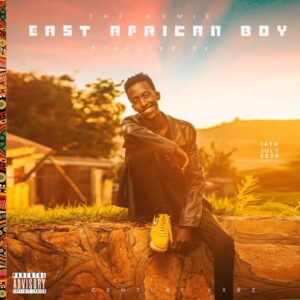
I think that’s mostly up to the listener but I’ll say this, this EP should be a weighing scale for my abilities as an artist and that doing you and following your own direction is the way to go because after all it is your art, you are the artist
You know before you leave I’ve to ask for your Top 5 UG hip-hop acts, drop them!
Navio
Tucker HD
The Mith
Fik fameika
Ruyonga
Interview
Mitch Isabirye on Poetry, Collaboration, and Culture: The Story Behind ‘Poetry in Motion EP’

Mitch Isabirye is a name that resonates deeply within Uganda’s spoken word community. A masterful storyteller and an ardent collaborator, his work has earned him a reputation as a poet who not only creates but also nurtures and uplifts the creative ecosystem around him. His latest contribution, a poem titled “Mother’s Land” on the Poetry in Motion EP alongside Maritza, is a testament to his artistry and the power of collaboration.
For Mitch, his involvement in the project was a result of years of consistency and dedication to his craft. “Hard work and consistency come naturally to me,” he says. “People connect with authenticity and a strong brand. The Tribe just reached out to me. I’m a collaborator by nature, so it made sense to be part of it.”
That openness to collaboration is a key part of Mitch’s journey. While his work often speaks for itself, he acknowledges the importance of social capital in the creative industry. “Sometimes the work alone is not enough. You have to be open to ideas, talk to people, and build relationships. We are in the business of social capital. People approach me not just because they know my work, but also because they know me personally. That made it easier for The Tribe to reach out.”
The Poetry in Motion EP was designed as a collaborative effort, pairing artists based on their strengths and storytelling approaches. Mitch was paired with Maritza, a poet whose methodical and research-driven style complemented his more spontaneous, in-the-moment approach. “I usually write in the studio. Maritza, on the other hand, is very structured and does deep research. We met a few times, discussed our concept, and she came back with everything structured. I then added my parts in the studio, complementing her work rather than changing it. The result was a seamless blend of our styles.”
Despite its ambitious scope, the EP comprises only four tracks—a decision driven by the producers. “To be honest, for something this big, four tracks feel like a disservice,” Mitch admits. “But it comes down to resources, time, and the overall vision of the producers.”
One of the central themes of the EP is migration and globalization, which naturally led to a discussion about culture and identity. For Mitch, culture is not static. “We have to appreciate that culture evolves. It can go extinct, be integrated, or even colonized. What matters is that creatives continue to play their part in preserving it. Even if your work impacts just one or two people, you’ve done something meaningful. Our identities can be passed down through our stories. People listen; it’s just a matter of what they choose to engage with.”
Spoken word, in particular, holds a unique place in cultural preservation. Mitch sees it as a continuation of African oral traditions. “Spoken word has always been part of African culture—people sitting around a fire, passing down stories and knowledge. It’s one of the oldest art forms, and it’s deeply embedded in our identity. What better way to keep that tradition alive?”
However, spoken word remains a niche art form, and expanding its reach is a shared responsibility between artists and platforms. “As an artist, I do what I can with my platform. But the question I always ask mainstream platforms is: What are you doing to amplify spoken word? It’s a collective effort.”
Looking ahead, Mitch continues to explore new artistic avenues. “I’m always collaborating. Right now, I’m working on a project with a visual artist. It’s something we’ve been developing for a while. I always have concepts coming to me.”
His journey as a poet has been largely self-taught, shaped by experience and observation. “Life keeps teaching me. I learn by watching others. I’ve attended workshops, conferences, and festivals, but my formal background is actually in science.”
On the question of making a living as an artist, Mitch is pragmatic. “This is what they don’t tell you: You need a hustle that supports the artist before the artist can support the hustle. People don’t pay for talent—they pay for the brand behind the artist. So, build a brand, and the opportunities will follow.”
As for what’s next, Mitch has something special in store for his audience. “I have a show coming up soon called Mitch’s Manifest. Watch out for it.”
Interview
Maritza on Breaking Continental Barriers with Spoken Word EP ‘Poetry in Motion’

When it comes to spoken word in Uganda, one of the names that you won’t miss is Maritza, a.k.a. Mama KLA. She has left a mark through her words and performances on the industry with works like her thought-provoking 20 Point Program poem, the intro on The Mith’s Ugandan album & the intro to DJ Chapat’s mixes, among others. She has now set her eye on the continent, having won Spoken Word Artist of the Year at the African Podcast & Voice Awards last year and now featuring in the Move Africa campaign by GIZ, the African Union, and Africa NoFilter through poetry. The campaign aims to reshape and enrich African media migration narratives, moving away from the current mainly crisis-centered stories to more balanced depictions.
The Tribe UG chose to explore this theme through a poetry EP titled Poetry in Motion, featuring a collective of Ugandan poets, whom we will be talking to as we lead up to the release of the EP on February 4, 2025. Poetry in Motion was made possible through the support of Africa No Filter, a sponsored project of Rockefeller Philanthropy Advisors, with funding provided by GIZ on behalf of the Government of the Federal Republic of Germany.
In this interview, we delve into the creative process behind the EP, the nuances of spoken word as an art form in Uganda, and the career trajectory of Maritza herself.
Maritza, you’ve been deeply involved in the spoken word scene and are actively trying to make a space for it in music. How did you get involved in the “Move Africa” project and how did that lead to the creation of the “Poetry in Motion” EP?
Maritza: Spoken Word can be misplaced, you know. Sometimes Spoken Word is in the literary community, but then it’s too cool to be in the literary community. Other times, you want to place it in more educational circles, but then sometimes it doesn’t really fit. In hip-hop, though, spoken word has a real place, and I felt that in Uganda, we hadn’t opened the door. Hip-hop and music hadn’t opened the door for spoken word like that. That’s why I’ve really been trying to work with The Tribe—getting together on projects, having conversations, and just putting things together. That’s how Poetry in Motion happened.
Felix found where we could find partners & funding to create a project with spoken word artists that we can attach to The Tribe UG. The art of spoken word is deeply rooted in the culture of hip-hop, because hip-hop has a background in spoken word. Artists like Gil Scott-Heron—though he’s not strictly a hip-hop artist—are spoken word artists, and most of his work is really spoken word.
The main reason I’m here with The Tribe is to push for that: to make space for spoken word in music. When Felix found this opportunity to partner with Africa No Filter, we put our heads together to figure out what we could do and which artists would be best for the project. We looked for artists who have already written socially conscious pieces.
This was the chance to involve Ugandan spoken word artists who are very good at this. There are many, of course—these are just the ones we could access. Off the top of my head, I thought of people like Kabera Angel. Kabera Angel is a soet – a song poet, and she was the first person that came to mind because she’s been making waves in the industry. Another person, who needs no introduction, is Wake 256. Wake is one of our leaders in this business—he’s the godfather, take a bow, salute! Another godfather in this is Isabirye Mitch, who was really a no-brainer. He’s exceptionally good with his play on words and his delivery, and he truly represents where he’s from.
It was important, especially for this conversation, because it was about migration narratives. That’s the real goal: to change the conversation on migration narratives. It’s the kind of topic that makes you ask why we’re fighting these things. This is Africa, so why do we have borders to the point that I have to beg for a Tanzanian visa just to visit my neighbors? It was something that was a no-brainer to contribute to.
So we thought of these artists: Kabera Angel, Wake, Isabirye Mitch, Jason Ntaro, Devis the Poet, Mcnrietta, and myself. That makes eight. Wait, did I miss somebody? I can’t miss anybody. Oh, and then another person—I almost forgot. Mcnrietta usually writes in Luganda, and she’s actually one of the best Luganda poets we have in the country. She writes beautifully, and she did an amazing track with Wake. Those artists came to mind because they have a strong voice, they write beautifully, and this is a narrative they’d love to be part of. We all want to grow as spoken word artists; we want to be international at some point, so joining this project was obvious.
Felix and I got together to figure out which people would be best suited and how to incorporate the themes we were given. Using my spoken word brain, I suggested some themes we could explore in this conversation. We submitted them, they were accepted, and we were able to get funding support from GIZ (on behalf of the Gemany Government), & partner with Africa No Filter & the African Union. So far, we’ve recorded all four tracks—though we’re still editing—and I’m proud of what we have. I think Felix and I chose well, and I’m really happy with what we are doing with it.
Yes, you all have done well. I’ve had a bit of early access to the tracks that’s ready – and it’s really good work. However, do you think the audience is ready for a product like this?
Maritza: We will make you get there. Pardon me—yes, we will make you get there, and that’s the real goal of this project. The thing about audiences is that they’re always ready for something beautiful, something groundbreaking that introduces them to another form of enjoyment. Even hip-hop took convincing, for some people at first, and that’s why it merged with certain genres, brought in R&B, and kept evolving over the decades. That evolution—like how LL Cool J used to rap, or how Jay-Z used to rap before he was Jigga—completely changed and adapted to different audiences.
So the audience might take time to be convinced about the work we’re doing, but when it’s good, and if you pay attention online—especially for artists like Isabirye Mitch and Wake, who have a strong online presence—when the art is top-notch, people have no choice but to pay attention. In fact, they’ll start looking for us (laughs).
I think that’s the hope with this project. If you listen, especially to the track with Wake and Mcnrietta, it doesn’t matter where you’re from or who you are—that track is a vibe. It’s well delivered, with drums and everything packaged so you can’t escape it. That kind of production in spoken word will definitely draw more eyes and attention. The more we package our work to make it easier and more accessible, the larger our audience becomes.
The problem is that spoken word doesn’t always get much investment, so we don’t often see well-produced products. That’s why this opportunity is great, especially with the best spoken word artists represented. We’ll see how we do, but I’m sticking with that idea that we’ll bring people in. It will show that there’s potential, and the art is good, you know, it won’t be negotiable anymore. So we really just have to keep doing this. And the consistency, I know, is what’s going to allow my dream of, you know, having spoken word, to have a proper place in the hip hop culture. That’s what’s going to allow that dream to happen.
The EP’s production is really good. One can definitely tell there was a lot of effort put into it. Who handled that? What were the sessions like?
Maritza: That is all Wake on the track!
So, I think Kabera Angel did play the guitar for her track, and she might play it again because they’re doing a re-record. She’s quite skilled on the guitar. If you’ve seen her TikToks, she’s a vibe, right? Let me tell you, people aren’t going to escape us now that we have someone like Kabera.
I also play the Akogo—the thumb piano—for the “Mother’s Land” track, so we as instrumentalists just contributed and let the producer do his magic. When Wake sat down at that computer—whoo, child—it was incredible. He did beautiful things. I love what he’s done. Even the track that’s being used in the promo was built from scratch while we watched the magic happen!
Our country is lucky to have the kind of multicultural diversity it has. Has the scene given a platform to enough artists from different cultural backgrounds?
Maritza: I’m always on the lookout, and the good thing about being in the poetry space as long as I have is that I’ve rubbed shoulders with some great vernacular writers. We’ve had the Bakiga on stage. There was a guy who was called The Man Eater—I think he was Ugly MC, the Man Eater—and he used to do Lusoga and Luganda as well. Then there’s Mitch, who really kills it with Lusoga, and Wake does it with Lugwere. You have that.
And there’s Mcnrietta. How Mcnrietta made her name is that she doesn’t dabble in English and Luganda; she’s a Luganda poet. I think there’s also Ssebo Lule — these artists fully represent their roots, talking about their experiences in their mother tongue. They don’t speak “city Luganda”; they speak the cultural language. If you’re not from there, some parts might go over your head, but they’ve done a great job showing how you can have a very entertaining track by using the cadences and rhythms of your language. They take advantage of that. If you hear “Webale,” you can hear the flow, the wordplay, the excitement.
I see it as a gift to be able to write like that in your language.
And when you do it in your local language, the audience gets bigger. I’m restricted to English audiences because I can’t write in my mother tongue, yet I speak it pretty decently. But being able to express yourself in your mother tongue is a real gift for those of us who grew up on English. It’s something I want to see more of, and I’m taking it upon myself to learn how to write in my mother tongue. Hopefully, in my older years, I can be that wise poet of the village (laughs).
We have to be deliberate about this because we live in a culture where people don’t have time to teach their kids their language. Many parents themselves don’t know their mother tongue, so it’s really up to the artists.
If you notice in hip-hop lately, even among English-speaking rappers and some singers in the hip-hop scene, they’re now incorporating more of their mother tongue. You see it with Ninja C’s songs last year. She has tracks like “Speak My Language.” Even The Mith last year came out with “Don’t Worry” and introduced something—his audience was like, “Wait, who’s this?” It’s become a deliberate move to represent our roots and remind people that we can express ourselves in our mother tongue. It’s an option we have; we just need to learn it.
So, in a really cool way, all this plays into the theme of what you guys are doing with the project, right? Globalization is happening right before our eyes—in spite of all the chaos surrounding migration. People still want to connect with others from the opposite side of the world. And it’s going to happen—one way or another.
How do we blend with the rest of the world while keeping our identity?
Maritza: I think it starts with what Agenda 2063 is really pushing for. Once the borders within Africa become more blurred—because right now, they’re way too solid—it’ll create room for a more unified identity. You know, it’s still really hard to move freely within Africa. For example, if you go to Kenya and try to get a job, it’s difficult because you’re not Kenyan. Companies there hiring Ugandans have to prove to the government that there’s no Kenyan available for the job. That’s a tough barrier to break. Sure, you can find ways around it, but that’s the current culture.
I feel like once we make the borders less rigid and allow ourselves to move, settle, and work freely in other parts of Africa, we’ll see beautiful things happen. For example, I honestly believe that Zambia and Uganda could blend beautifully. If the borders were more fluid, the cultures would mix seamlessly.
And, you know, these borders weren’t drawn by us; they were imposed during the scramble for Africa. A lot of what defines the continent today was decided without our input. Once we take responsibility for our own development and embrace each other as Africans, we won’t have to worry so much about competing with the rest of the world.
Look at how people outside Africa gravitate toward our culture. Beyoncé, for example, once shifted her entire production team to Africa just to tap into that richness. We are the source of so much inspiration and value. If we do the work for ourselves and each other, we won’t need to chase after the world—they’ll come to us.
There are already Africans in every corner of the world. If we strengthen our connection to those diaspora communities, they’ll stay grounded and connected to home. Right now, it’s a lot of work to even find African talent. Say you’re looking for an artist—you first have to Google their name, search for their work, and dig through layers of obscurity.
But imagine if that work was in plain sight—on mainstream radio, TV, or even TikTok ads. Imagine seeing a spoken word artist promoting a major brand like Stanbic Bank. Once we get to that level, we won’t have to convince anyone about our value. People will naturally gravitate toward African art, culture, and innovation.
This kind of visibility becomes much easier when we accept and uplift one another. That’s really what Agenda 2063 aims for—labor mobility and cultural exchange across Africa. I honestly believe that free movement does more good than harm. It encourages innovation, collaboration, and growth.
I don’t know if by 2063 we’ll have achieved all the goals, but that’s the vision. We can’t become a global powerhouse without first empowering Africa. If you want to be an international star, you’ve got to win over your home first.
I’m one of those people who believe Africa is a country—even if metaphorically speaking. It’s okay to think of us that way because, deep down, we really are one people.
To bring it back to the project, who are we really speaking to here?
Maritza: We’re talking to music fans, we’re talking to poetry fans, we’re talking to hip-hop fans, and then we’re talking to Africans. And the reason I’m excited that they used spoken word for this message is because spoken word allows you to tell stories. You know, like, I think we’re a bit more limited with a song and maybe even a hip-hop track because you have to have the chorus there, and your stanzas also can’t be too long because you lose the audience. So I feel like the best form of art to tell the story, and I guess even push the agenda, is spoken word. So we’re talking to anyone who has ears.
And the reason I’m excited that it’s poets is because poets don’t always have the chance to be on a track. A lot of our work is trackless. We are the track. We are the lyrics. We lose a certain audience because we don’t put music on our tracks, because we don’t add instrumentals. So this has allowed the opportunity to, I guess, reach certain corners of entertainment that spoken word on its own struggles to reach.
And then what I’m hopeful for is that this is just the beginning. You know, once you hear the track “Webale”, you’re going to ask Mcnrietta for all her work. Once you hear “Mother’s Land”, you’re going to search for Mitch, like, “What is this man up to? Does Maritza have more work?” You know, even like how you were asking. You listened to the intro and were like, “We want more.”
The question of inclusivity. How, on the ground, with the small numbers you’ve worked with, are the ratios—male to female—so far?
Maritza: It has to be intentional because I’ve been on teams where, you know, we’re looking for people to perform, and by the end of the list, it’s seven men and one woman (laughs). It really has to be deliberate. And because there are voices like mine in spaces like that, I will always be deliberate about inclusivity.
Not even just male and female. For me, my inclusivity also includes people who write in their mother tongue, people who have a different delivery and still belong to the spoken word community.
What spoken word has faced—since I started doing it in 2012—is gatekeeping. We are gatekept. They keep us outside the gate. Sometimes you also find poetry spaces that are gatekeeping. It’s like us, who are gatekept, gatekeeping others (laughs).
So it’s about being deliberate, about being open and welcoming. Because the truth is, this art has been around for so long that people need direction on how to exist as spoken word artists.
Some of those artists we’ve met—they are also changing the status quo for their entertainment scenes. Because now you have to let people know this is an entertainment form, this is a way to communicate, this is a way to cause civic change or be part of the conversation.
So it has to be deliberate for every individual, because this art has been an upcoming art form for so long.
You appear on The Mith’s album—on the intro—and did amazingly. Do we hope to see a Maritza full-blown album or a body of work of that magnitude? Because what you’re writing is basically rap. You really do have an actual rapper in you.
Maritza: I do have an actual rapper in me. I’m a spoken word artist who writes with the mind of a rapper. Some of my inspirations include Kendrick Lamar and Lil Wayne. I love the way they play with words, and I bring a lot of that into my own writing.
I actually have albums already written—three of them, in fact, over the last two years. I’m trying to figure out how to put them into a cohesive album. Spoken word can be tricky to package, especially if it’s an album with no instrumentals. That can be harder to place on streaming platforms like Spotify. So for that particular album, I recorded a visual piece—basically a live performance set. It’s fully done and just waiting to be released this year.
So I think I’ve now also entered, like, the mind of an artist. Because before, when I was in corporate culture, I really operated on execute release, execute release. But I’ve learned the way artists work is they can have like, one album, and they’re working on it for two years, and I never understood what that was until I joined them (laughs), and now I’m here with my albums that I have had for two years. I’m trying to package this so people don’t overlook it. My style of writing requires people to see me perform, which makes it harder to package like a regular music track. Spoken word is a very visual experience. Hence the live performance.
I’m also planning to record a full album for Spotify, Apple Music, and Tidal, but it all needs funding. However, you can work around some of those costs. So far, I haven’t had to spend too much, because I can swap services for production. The main challenge is figuring out how to exist as a spoken word artist and package the work in ways that preserve the visual side of the performance. If you’ve seen Kabera Angel on TikTok, she’ll do a vlog-style video with poetry over it. That’s a form of digital poetry. We need many creative ways to deliver that visual aspect of spoken word.
So yes, I do have bodies of work. Please wait for me, support me, and keep me in your prayers. When we release, I hope you’ll subscribe and spread the word.
Interview
INTERVIEW: TRAP’KID BRIZZY – TRUE REAL AND PROUD
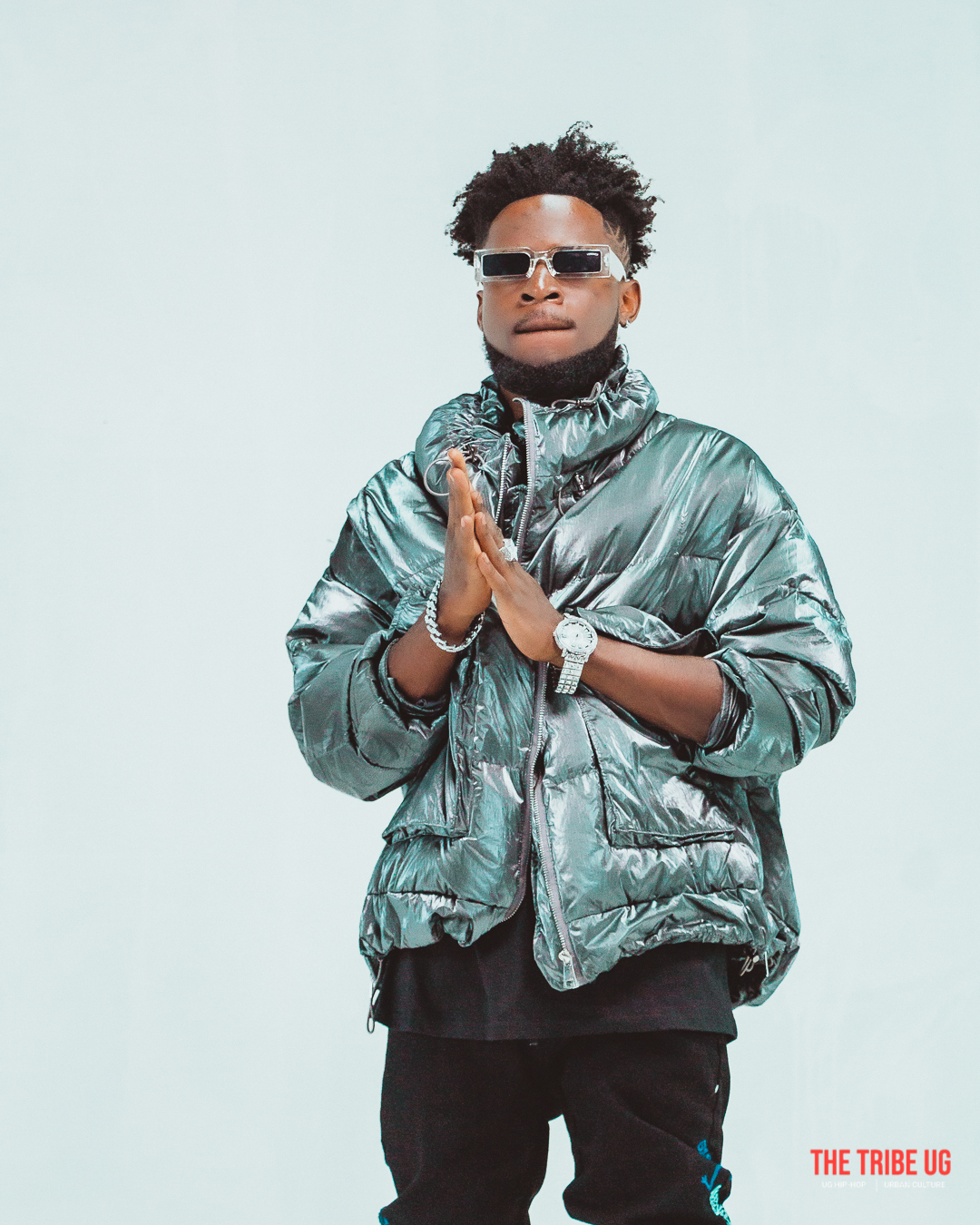
By @TheCountMarkula
The past couple of years have been quite eventful for Trap’kid Brizzy. The young rapper has been on a major journey that kicked off with his audition for the MTN Pulse Rap Battles. Trap’kid did not just participate in the competition; he put in the work and made it all the way through to the end, where he emerged victorious and took home the 15 Million Uganda Shillings cash prize.
We got a chance to sit down and talk to Trap’kid Brizzy, so he could share some insight into this whole experience in his own words. We started by asking him about the mentality with which he went into the pulse rap battles.
At first, I knew that I wanted to do music, but I had more interest in dancehall and RnB. I knew that freestyling would not be easy, but I came in ready to challenge myself and gauge myself next to real battle rappers.
What was your toughest challenge during the MTN Pulse Rap Battles?
The competition had many interesting challenges, but there was one where we had to freestyle in the market, and I was feeling a bit shy because I was worried that people might think I am crazy. That was the most difficult one for me.
What was your favorite moment of the whole thing?
My favorite moment from the MTN pulse rap battles is probably one of my favorite music moments ever! We had a challenge where we had to rap at City Square and attempt to attract a crowd. I was successful. People were excited, and it made me happy because it was validating the work I put in.
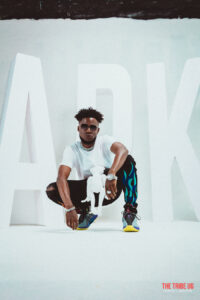
One of the rewards for winning the MTN Pulse Rap Battles was a 6-month mentorship program with UG’s very own, the Legendary NAVIO! MTN granted both Trap’kid and runner-up, The Homie, a chance to learn from the best. We asked Trap’kid how much he had learned from the numerous sessions with Navio and how much influence this might have on the music he makes in the future.
Listen, Navio is a REAL LEGEND. It is not just about the music! It is beyond that! His level of impact is different! I learned so much from him. He shared so much knowledge about so many things; from humility to teamwork, making music with a message, keeping it real, emotional attachments, Relatability… He really changed my perspective, and it’s part of the reason why I’m “True Real And Proud”
After the long apprenticeship, MTN together with Skyline Media and The Tribe UG organized the MTN Pulse Rap Battle Showcase. The two winners graced the stage, alongside a number of other UG Hip Hop artists like Navio, Flex D’ Paper, Recho Rey, 1der JR, Babaluku, and Lady Slyke. We asked Trap’kid what it was like to be on a big stage with so many big artists. (Especially in these “covid times” where shows and performances have been scarce)
Let me tell you something that happened; I got into an accident on my way to the showcase. I had injuries on both my legs, as well as my right palm, the one that holds the mic. It was as if God was testing me, but I had to push through and get it done.
I mean, it was like a dream come true. Beyond dreams! It was MAGICAL! We grow up seeing some of these artists and never expect to meet them, let alone be on stage next to them. It was an amazing experience.
After the performances, Trap’kid Brizzy received a Plaque from The Tribe UG for successfully completing his mentorship program. We had to ask him about the experience of receiving it, and what he had done with it.
I REALLY value all my achievements. When I chose to get serious with this music thing, I was doing exams at the university. I had to make a decision. I left uni(Law) to do this, and winning was the ultimate reward for the sacrifice. I treat all the achievements like graduations; every win is a graduation to the next level.
The plaque was an amazing thing to get. I took it straight to my mother. She was super proud. She is supportive and she is very happy with the decisions I made. Receiving the plaque from The Tribe UG inspired me because right now, I feel like I need to figure out what to do to earn more plaques. I can’t settle. I have to strive for more.
In case you thought that was it for the winner, you thought wrong. MTN made sure the winner came out with an album. Trap’kid Brizzy’s debut album T.R.A.P (True Real And Proud) produced by Mio Made is officially out. We asked Trap’kid about his experience making the album and working with one producer to put together a body of work.
I would not have it any other way. Mio Made is special. Our connection is special. This is definitely not the end. I would love to continue to make more music with him. I am lucky to have had access to a producer that completely understands me and knows how to complete my ideas. I explain what I want from a song, and he immediately gets me and brings it out in the production. It made the whole thing come easy.
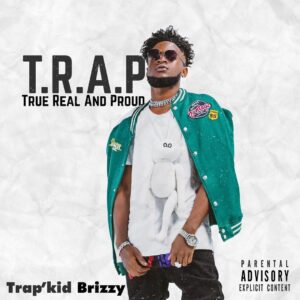
At the MTN Pulse Rap Battle Showcase, Trap’kid performed Ngwala ft. Flex D’ Paper and The Homie. Trap’kid told us a little about his experience working with the Homie (especially after competing against each other).
We have always been on the same side. Even when the competition was still on.
Now when it came to the studio session. It was easy because it was a vibe. We were already having a good time, and the music just came through with the same energy we had.
Believe it or not, the rewards are not yet done. The Tribe UG brought IV League on board to direct and shoot a music video for Trap’kid. The music video for his single Me Myself and I is also out. We asked Trap’kid Brizzy about his thoughts on getting an album and a video released all at once.
It’s a Blessing! I always knew I wanted to make music and do it big, but I had no idea how I was going to do it. I was not sure how I was going to pay for the studio sessions or the music videos. This is why I am very thankful to MTN. I do not take this lightly. I will forever be grateful to them because many people out there are talented, some even more talented than me, but I am the lucky one that has been given this opportunity.
As a Muslim, I can only say Alhamdulillah!
Check out the video for Me, Myself & I:
Someone pointed out that winners of singing shows all over the world tend to vanish off the radar the moment the buzz from the show is done. The person said that this might be because they have won, and tend to make the mistake of thinking that their work is done. In one of the video packages for the MTN Pulse Rap Battle Showcase, Trap’kid himself mentioned that one of his biggest weaknesses earlier on was his work ethic. We had to ask him if he was now ready, willing, and motivated to break the “winner’s curse” and put in the necessary work to take on the UG music industry that is not always easy to navigate.
I always like to be honest with myself. Like I said, I’m True, Real And Proud. I knew that I had a weakness when it came to work ethic, and I had to acknowledge it in order to correct it. That is why I can say that it is a thing of the past.
In addition, God gave me a blessing. Just after the win, he gave me a son. My son is now my biggest motivation. I know I have to put in the work continuously because my son has to eat. The music is supposed to put food on the table, so I have to work hard in order to take care of all my responsibilities.
Finally, my dream has always been to bring the UG sound to the world. It won’t happen easily, but I can’t stop until I have achieved this. Right now, I have the first entry on my musical C.V, but I have to add a lot more.
Trap’kid seems to be a man with a plan and we cannot wait to watch him grow as an artist and achieve his dreams. As usual, we had to end on a lighter note and ask Trap’kid Brizzy to let us know some of the Ugandan artists he would love to work with in the future.
I would love to work with talented artists who have amazing energy that I can be able to feed off in one way or another to create great music.
I would love to work with Azawi, I’m sure we all see how talented she is, and how she makes music we can easily relate to.
I would love to work with Navio. I didn’t want to say it, because you might think I’m biased. But seriously. Navio is amazing! He’s a true legend. I love Navio.
MAURICE KIRYA.
I would love to work with Kent & Flosso. Their energy is just perfect!
This marked the end of our chat. Don’t forget to check out the album on your platform of choice HERE
-
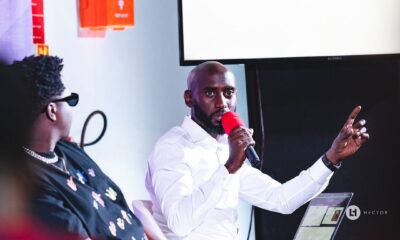
 ARTICLES6 months ago
ARTICLES6 months agoElevate Your Music Career: Join AUMEX’s Essential Branding and Marketing Masterclass
-
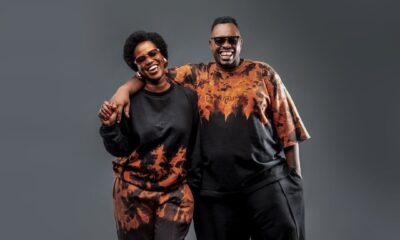
 ARTICLES6 months ago
ARTICLES6 months agoBrian Babu and Regalia Apparel Launch Unisex ‘Uwili’ Capsule Collection
-
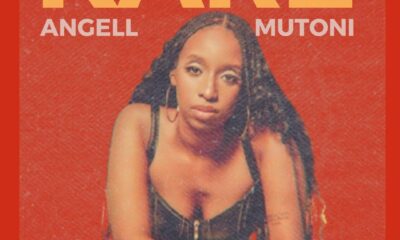
 ARTICLES4 months ago
ARTICLES4 months agoAngell Mutoni Drops Bold New Single “Kare” Ahead of Debut Album
-
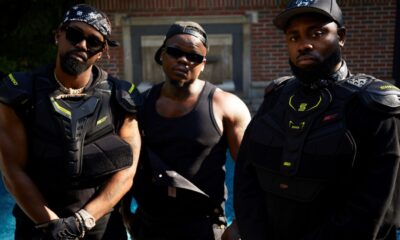
 ARTICLES4 months ago
ARTICLES4 months agoKJ Spio, Harmonize & Konshens Unite for ‘Messi
-
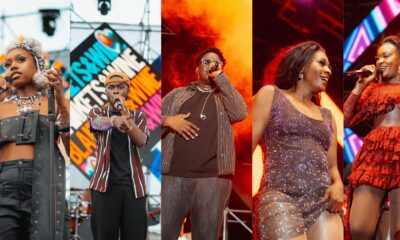
 ARTICLES6 months ago
ARTICLES6 months agoAn Introvert’s First Dive into Blankets & Wine.
-
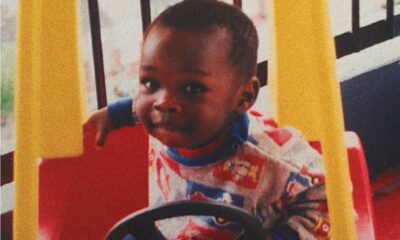
 ARTICLES4 months ago
ARTICLES4 months agoBreaking the Mold: GrG’s Tumenya Mateeka.
-
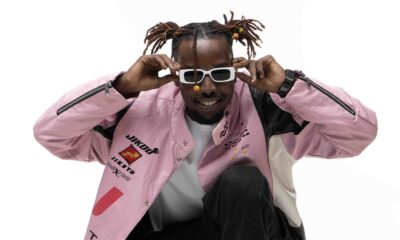
 ARTICLES6 months ago
ARTICLES6 months agoREVIEW: Kohen Jaycee – RWEBEMBERA – A Full Course Meal!
-

 ARTICLES7 months ago
ARTICLES7 months agoSpotify Masterclass Debuts in Uganda: A Game-Changer for Local Music and Artists.



